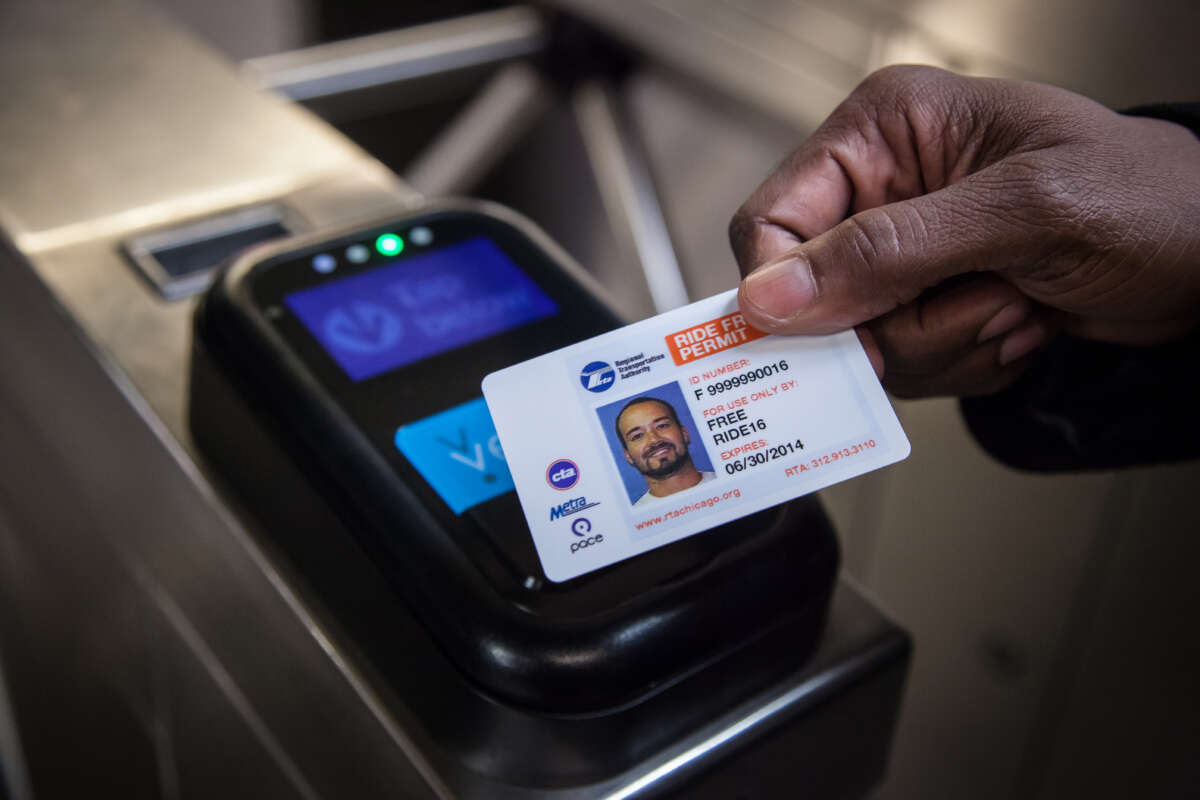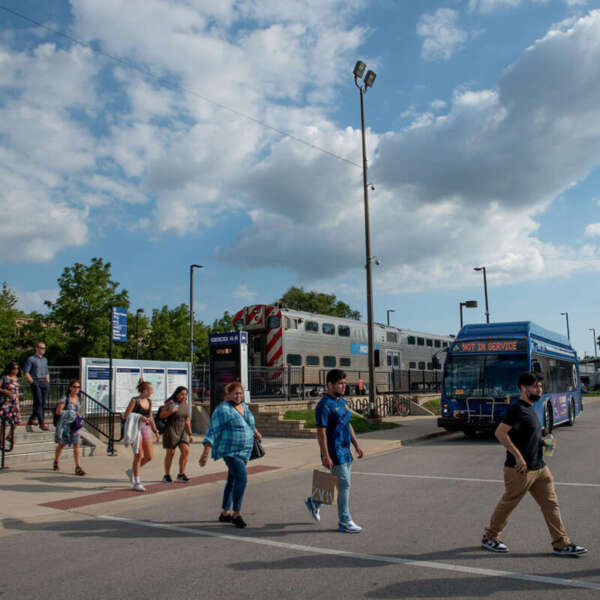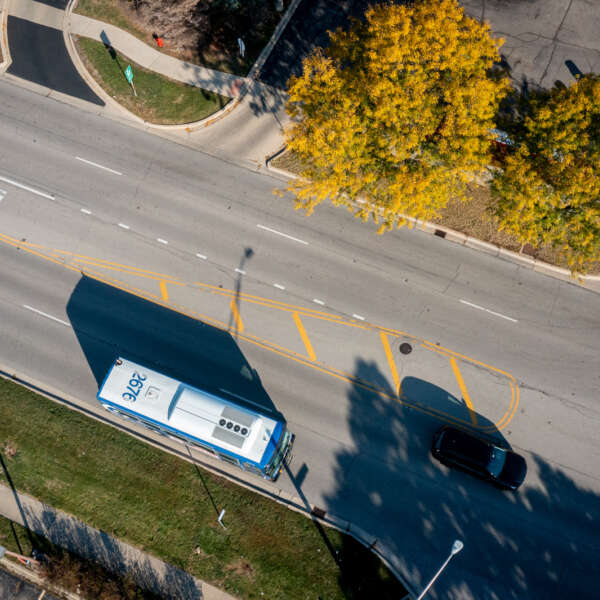RTA begins exploring reduced fares for riders with low incomes
May 4, 2023
May 4, 2023

Transit is the answer to connecting the most vulnerable people in our region to jobs, healthcare, and other opportunities. Chicago’s regional transit system gives thousands of residents with disabilities and older adults independence through ADA paratransit and reduced fare and ride free programs, but these programs have been deeply underfunded for too long.
The RTA is committed to change that will make our transit system more equitable while maximizing the impact of public funds. One of the action items from the RTA’s regional transit strategic plan, Transit is the Answer, is to make paying for transit more seamless and affordable. This action item includes pursuing funding for a program that will provide free or reduced fares for riders with low incomes. The RTA will host the first quarterly Transit is the Answer Coalition meeting on May 9 to gather input from coalition members on how to bring a program like this to life.
Fully funding and expanding regional reduced fare and ride free programs increases access for those residents who need it most. Many older adults, people with disabilities, and people with low incomes have limited transportation options. Affordable transit makes it possible for these individuals to get to work, the grocery store, the doctor, and other essential destinations, as well as stay connected to their communities and social circles.
Fundamentally, our region’s transit system is underfunded and over-reliant on fares, with one of the most restrictive farebox recovery ratios in the country. This has led to an over-emphasis on ridership rather than equity and access, meaning high-ridership routes enjoy continued investment while lower-ridership routes may be left behind—even if those routes serve populations of high need. When transit providers can disentangle fares from operating revenue, they can instead focus on having the greatest impact and deliver service to the people who need it most. Fully funding and expanding regional reduced fare and ride free programs is one strategy toward a system less reliant on fares.
Pursuing full funding for these programs is also one way to reduce our regional transit system’s impending budget gap, for which state reimbursement has lagged far behind the cost of providing service.

Currently, the region’s transit agencies provide different reduced fare and ride free programs for children, students, military personnel, and police and fire personnel. Each agency has unique offerings, and more information can be found online for current CTA, Metra, and Pace programs. The RTA coordinates reduced fare and ride free programs for older adults and individuals with disabilities for the entire region. These passes are valid for rides on CTA, Metra, and Pace. In 2022, more than 280,000 people held reduced fare or free ride passes from the RTA.
Older adults and people with disabilities who are enrolled in the Illinois Department on Aging’s Benefit Access Program are eligible to ride free on the CTA, Metra, and Pace fixed-route services. All individuals 65 years and older who are ineligible for the RTA Ride Free Program are eligible to receive a reduced fare permit. All persons with a qualifying disability who are ineligible for the RTA Ride Free Program are eligible to receive a reduced fare permit. To qualify, individuals must submit proof of disability. Individuals with a valid Medicare card are eligible for a reduced fare permit.
Development of Transit is the Answer involved convening five working groups of more than 100 stakeholders to examine key topics for the plan, identify priorities, and develop recommendations. It was important for RTA to work in partnership with diverse stakeholders and together build the goals and strategies that frame this plan. The stakeholder working groups pushed for expanding access to reduced fare or free rides to members of households experiencing low incomes. This could help make transit more financially accessible and equitable.
Progress related to this action already include:
There are myriad ways to set up a reduced fare or free ride program for riders with low incomes. A few options include:
Some programs are based on income and require some method of income verification. A 2021 study showed that 17 of the largest U.S. transit agencies offer such programs. Typically, these agencies offer a 50% discount on fares for participants with incomes below a threshold of 125% to 200% of the federal poverty level. The RTA researched 11 fare programs for riders with low incomes across the United States and Canada and found that discounts range from 40% off to completely free rides. Most programs use enrollment in other government benefit programs as an income qualifier, and some allow for other proof of income like pay stubs.
In the Seattle region, the ORCA Lift program offers riders experiencing low incomes reduced fares of $1 on King County Metro and several other regional transit systems. Participants who earn less than 200% of the federal poverty level can enroll using the same network of more than 40 social service providers that helped people enroll in Affordable Care Act health insurance across the region.
In the San Francisco Bay Area, the Clipper START pilot program offers discounts of 20% or 50% for riders experiencing low incomes on 21 of the region’s 27 transit agencies. The program was launched in 2020 after the completion of the Regional Means-Based Transit Fare Pricing Study in 2018. Participants with household incomes less than 200% of the federal poverty level can enroll through the Metropolitan Transportation Commission.
Other programs are based on geography and target transit routes that touch areas with a high concentration of residents with low incomes. MBTA in Boston allows people to board at all doors without paying a fare on three high-ridership bus routes in low-income areas. Here in the region, the Fair Transit South Cook pilot allows riders to pay 50% discounted fares on Metra’s Electric and Rock Island lines across Chicago’s South Side and South Suburbs.
Still others target a demographic group, such as students or youth. The CTA, Metra, and Pace currently have their own individual reduced fare programs for students, but one option is to institute a more uniform regional free fares program for students or youth or another demographic group.
Active Transportation Alliance’s Fair Fares Chicagoland found that the current cost of transit discourages transit usage and can keep people from looking for work, accessing medical care, and attending social events. CMAP’s Improving Equity in Transportation Fees, Fines, and Fares report includes an activity-based model that estimates expanding the reduced fare permit to residents with low income would result in these residents taking 15% more transit trips. A 2019 MIT study found that low-income riders with a 50% discount took about 30% more trips than low-income riders paying full fare. A review of free and reduced fare programs for riders with low incomes in California found that these programs led to ridership increases and improved school and after-school attendance.
Developing, coordinating, and implementing these types of programs across multiple agencies would be complex and have financial impacts, but other regions have worked to overcome similar challenges. Join the RTA’s Transit is the Answer Coalition and register for the first quarterly coalition meeting to weigh in on a potential program for northeast Illinois.
Subscribe to our Newsletter
Related Articles
 Transit station activation in Uptown brings positive presence to Broadway bus route with weekly outdoor yoga class
Transit station activation in Uptown brings positive presence to Broadway bus route with weekly outdoor yoga class
On Friday mornings now through the end of the year, CTA #36 and #81 bus riders and Red Line passengers through the Uptown neighborhood of Chicago may catch a...
July 25, 2024 Join the RTA Transit is the Answer Coalition to discuss possible reforms to improve service and accountability for riders
Join the RTA Transit is the Answer Coalition to discuss possible reforms to improve service and accountability for riders
Following the introduction of legislation that proposes changes to how the Chicago region’s transit agencies are organized, the RTA continues to lead convers...
July 15, 2024 RTA releases new fare equity report, recommending fully funding and expanding reduced fare programs
RTA releases new fare equity report, recommending fully funding and expanding reduced fare programs
A new report released by the RTA in July, Building a More Equitable Fare Structure for Public Transit in the Chicago Region, recommends that the state legisl...
July 11, 2024 Homewood, Richton Park adopt transit-oriented development plans funded through RTA Community Planning program
Homewood, Richton Park adopt transit-oriented development plans funded through RTA Community Planning program
This spring, transit-oriented development (TOD) plans were adopted by the villages of Homewood and Richton Park that will make these communities more transit...
July 11, 2024 Good news: Regional transit ridership reaches new high as CTA, Metra, and Pace increase service, offer new fare products
Good news: Regional transit ridership reaches new high as CTA, Metra, and Pace increase service, offer new fare products
Ridership across Chicago’s transit system has continued to increase, with May 2024 seeing the highest ridership levels since 2019 for CTA, Metra, and Pace. T...
June 28, 2024 Legislative Update: Lawmakers pass state budget, action on transit funding still needed ahead of fiscal cliff
Legislative Update: Lawmakers pass state budget, action on transit funding still needed ahead of fiscal cliff
The Illinois General Assembly adjourned this year’s spring legislative session after passing an overall $53.1 billion budget for State Fiscal Year (SFY) 2025...
June 27, 2024